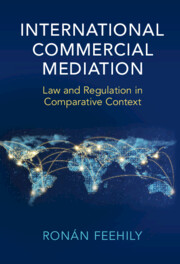Book contents
- International Commercial Mediation
- International Commercial Mediation
- Copyright page
- Dedication
- Contents
- Preface
- Foreword
- Cases
- Statutes
- International Conventions, Laws, Codes and Rules
- 1 Introduction to Commercial Mediation
- 2 Commercial Mediation in the International Context
- 3 Agreements for Future Mediation
- 4 Approaches to Mediation
- 5 Mediators and Their Appointment
- 6 Lawyers and Other Professional Mediation Supporters
- 7 Conduct and Costs
- 8 Mediated Settlement Agreements
- 9 Confidentiality
- 10 Process Controversies
- Bibliography
- Index
10 - Process Controversies
Published online by Cambridge University Press: 01 September 2022
- International Commercial Mediation
- International Commercial Mediation
- Copyright page
- Dedication
- Contents
- Preface
- Foreword
- Cases
- Statutes
- International Conventions, Laws, Codes and Rules
- 1 Introduction to Commercial Mediation
- 2 Commercial Mediation in the International Context
- 3 Agreements for Future Mediation
- 4 Approaches to Mediation
- 5 Mediators and Their Appointment
- 6 Lawyers and Other Professional Mediation Supporters
- 7 Conduct and Costs
- 8 Mediated Settlement Agreements
- 9 Confidentiality
- 10 Process Controversies
- Bibliography
- Index
Summary
With suggestions that settlements reached through mediation lack the ‘legitimacy’ of authoritative judicial decisions, the mediation process has elicited criticism. The referral of commercial disputes to mediation gives rise to the understandable concern that mediation could inhibit the development of commercial law. The benefit of mediation over litigation and arbitration – its private and informal nature – can also create potential risks; given the absence of judicial due process safeguards, opportunities can exist for manipulative and oppressive behaviour. Courts and tribunals play an important role in defining the appropriate limits of the mediation process. The primary controversies relating to the commercial mediation process can be categorised into three groups: substantive fairness, procedural fairness and public interest concerns. Much of the criticism of mediation stems from the fact that many different processes are, regrettably, characterised collectively as ‘mediation’. The judicial system and mediation should be viewed as having a symbiotic relationship, with each contributing different principles to an interconnected and increasingly integrated justice framework.
Keywords
- Type
- Chapter
- Information
- International Commercial MediationLaw and Regulation in Comparative Context, pp. 293 - 310Publisher: Cambridge University PressPrint publication year: 2022

